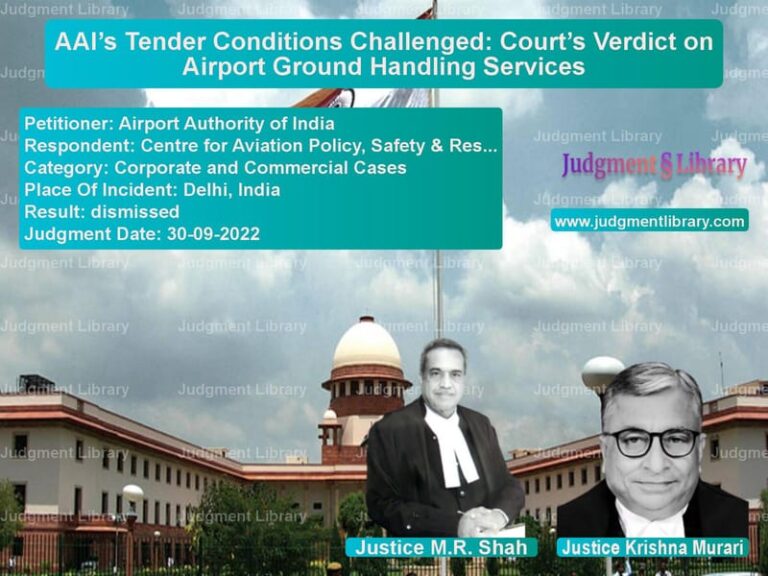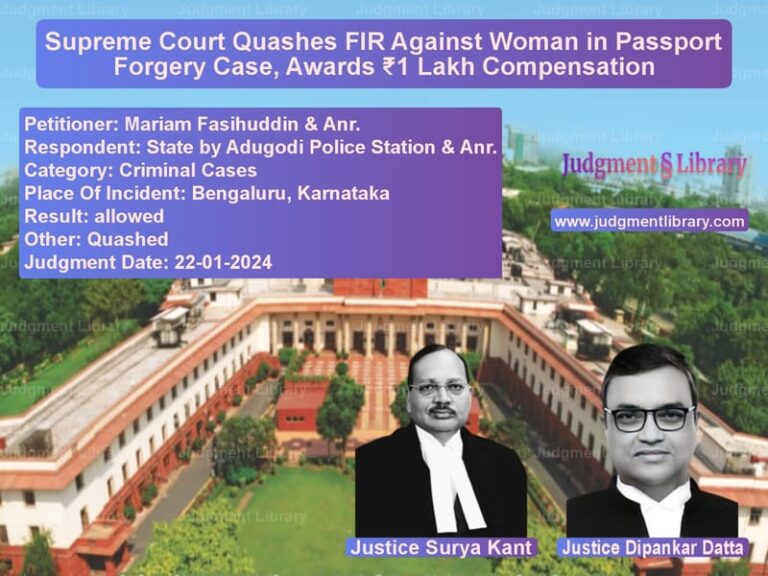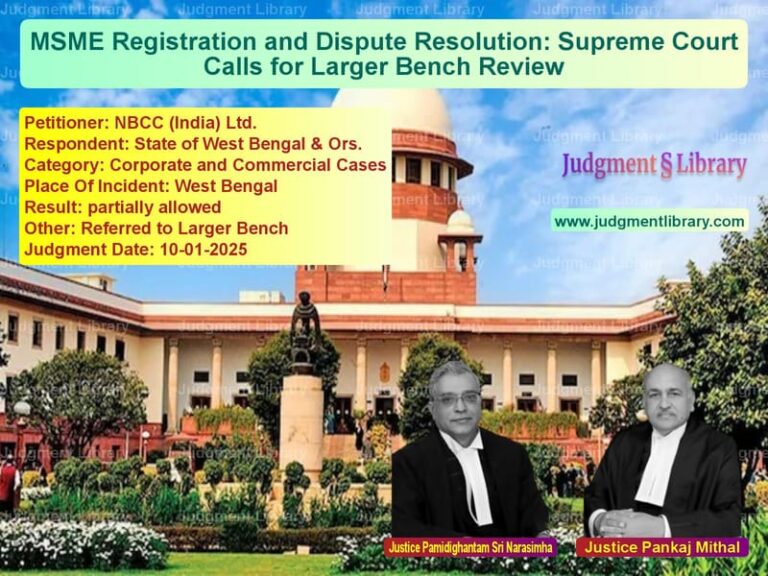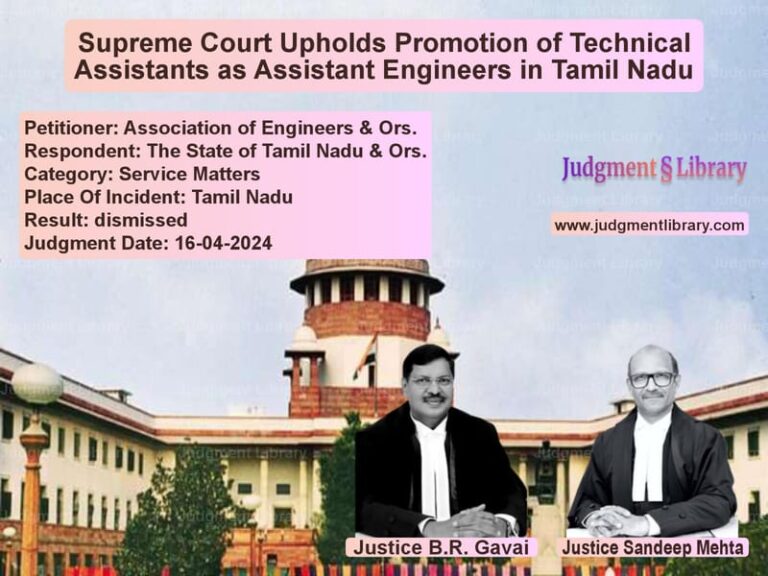Supreme Court Upholds Rejection of Partition Suit in Kerala Property Dispute
The Supreme Court of India recently decided on a long-standing property dispute in the case of M. Sivadasan (Dead) Through LRs. & Ors. v. A. Soudamini (Dead) Through LRs. & Ors.. The case revolved around a claim for partition and mesne profits over ancestral property in Kerala, originally filed in 1988. The appellants had lost their case at all levels—the Trial Court, the First Appellate Court, and the Kerala High Court. In this final appeal, the Supreme Court reaffirmed the lower courts’ rulings and dismissed the claim.
Background of the Case
The appellants, belonging to the Thiyyas community of Kozhikode, Kerala, filed a partition suit in 1988 before the Principal Munsif, Kozhikode-I. They claimed a share in ancestral property measuring 75 ½ cents, which included an ancestral residential house.
The Trial Court dismissed the suit on 03.02.1993, ruling that the property was agricultural land and could not be partitioned under the existing legal framework. The First Appellate Court and the Kerala High Court upheld this ruling, with the High Court giving its decision on 29.01.2009. The plaintiffs then approached the Supreme Court.
Key Legal Issues Considered
The Supreme Court had to determine:
- Whether the property in question was agricultural land and thus not subject to partition.
- Whether the Hindu Women’s Right to Property Act, 1937, and the Hindu Succession Act, 1956, provided rights to the appellants.
- Whether possession was a key factor in determining rights under Section 14(1) of the Hindu Succession Act.
- Whether the plaintiffs’ claim was barred by adverse possession.
Arguments by the Appellants
The appellants contended that:
- The land should not be classified as agricultural merely because it contained coconut trees.
- The Hindu Women’s Right to Property Act, 1937, and the Hindu Succession Act, 1956, gave rights to the female heirs.
- The widow of Sami Vaidyar (original owner), Choyichi, had limited ownership rights under the Hindu Mitakshara law, which later became full ownership under Section 14(1) of the Hindu Succession Act.
- The lower courts wrongly decided the nature of the land and did not consider their rightful claim.
Arguments by the Respondents
The respondents argued:
- The land was agricultural and had always been in the possession of the male heirs.
- Under the Thiyyas community’s customary law, daughters had only a right to maintenance until marriage, not inheritance.
- The succession had already taken place in 1942, prior to the 1946 amendment of the Hindu Women’s Right to Property Act.
- The plaintiffs never possessed the land, and their claim was barred by adverse possession.
Supreme Court’s Analysis and Judgment
1. Land Classification as Agricultural Property
The Supreme Court agreed with the lower courts that the land in question was agricultural. It stated:
“The land in question undoubtedly has coconut trees on it, most of them are very old but fruit-bearing, and moreover, in revenue records, the land is described as ‘theaattam’ (garden), indicating agricultural use.”
2. Applicability of Hindu Succession Laws
The Court noted that the Hindu Women’s Right to Property Act, 1937, did not apply to agricultural land before its amendment in 1946. Since the succession occurred in 1942, the law at the time did not grant any inheritance rights to female heirs. The Court stated:
“The Hindu Women’s Right to Property Act, 1937, was not applicable to agricultural land until its amendment in 1946. Since succession to the property had already opened in 1942, the amendment did not affect the rights of the parties.”
3. Importance of Possession for Claiming Rights Under Section 14(1)
The Court emphasized that Section 14(1) of the Hindu Succession Act applies only when a female heir is in possession of the property. Since the plaintiffs never possessed the property, they could not claim ownership under this provision.
“The essential ingredient of Section 14(1) is possession over the property. The plaintiffs were never in possession of the property; it was always with the defendants. Therefore, Section 14(1) does not apply.”
4. Adverse Possession
The Court also ruled that the plaintiffs’ claim was barred by adverse possession, as they had not challenged the defendants’ ownership for decades. It noted:
“The findings of the Trial Court that the rights, if any, of the plaintiffs had been lost by adverse possession and ouster were never challenged before the First Appellate Court.”
Supreme Court’s Final Decision
The Supreme Court dismissed the appeal, stating that the appellants had failed to show any special circumstances warranting intervention. The Court observed:
“We do not find any special circumstances that may warrant our interference. The concurrent findings of the Trial Court, First Appellate Court, and High Court are upheld. The present appeal is hereby dismissed.”
Conclusion
This ruling reinforces the principle that:
- Partition claims must align with established property laws and customs.
- Possession is a key requirement under Section 14(1) of the Hindu Succession Act.
- Claims to property must be timely, or they risk being barred by adverse possession.
The decision serves as an important precedent in property disputes, particularly regarding Hindu Mitakshara law and succession rights in Kerala.
Petitioner Name: M. Sivadasan (Dead) Through LRs. & Ors..Respondent Name: A. Soudamini (Dead) Through LRs. & Ors..Judgment By: Justice C.T. Ravikumar, Justice Sudhanshu Dhulia.Place Of Incident: Kozhikode, Kerala.Judgment Date: 28-08-2023.
Don’t miss out on the full details! Download the complete judgment in PDF format below and gain valuable insights instantly!
Download Judgment: m.-sivadasan-(dead)-vs-a.-soudamini-(dead)-supreme-court-of-india-judgment-dated-28-08-2023.pdf
Directly Download Judgment: Directly download this Judgment
See all petitions in Property Disputes
See all petitions in Judgment by C.T. Ravikumar
See all petitions in Judgment by Sudhanshu Dhulia
See all petitions in dismissed
See all petitions in supreme court of India judgments August 2023
See all petitions in 2023 judgments
See all posts in Civil Cases Category
See all allowed petitions in Civil Cases Category
See all Dismissed petitions in Civil Cases Category
See all partially allowed petitions in Civil Cases Category







